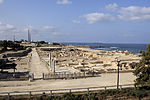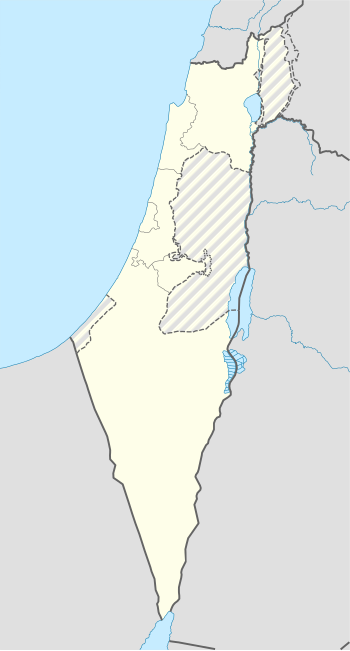List of World Heritage Sites in Israel
The United Nations Educational, Scientific and Cultural Organization (UNESCO) World Heritage Sites are places of importance to cultural or natural heritage as described in the UNESCO World Heritage Convention, established in 1972.[1] Cultural heritage consists of monuments (such as architectural works, monumental sculptures, or inscriptions), groups of buildings, and sites (including archaeological sites). Natural heritage is defined as physical and biological formations, geological and physiographical formations (including habitats of threatened flora and fauna), and sites which are important from the point of view of scientific research, conservation or natural aesthetic.[2]
The State of Israel ratified the convention on 6 October 1999, making its cultural and natural sites eligible for inclusion on the list. The country has nine sites, all of which are cultural. The earliest inclusions were Masda and the Old City of Acre in 2001; the latest inclusion was the network of caves at Beit Guvrin-Maresha National Park in 2014. In addition, the Israeli cabinet has put 18 sites on its tentative list, meaning they intend to nominate them as World Heritage Sites sometime in the future. 14 of them were put in the year 2000. Unlike the official list, the tentative list contains several sites of natural and mixed heritage.[3]
Due to its occupation of the State of Palestine, Israel has a strained relationship with UNESCO, described by Palestinian journalist Ramzy Baroud as "an existential battle".[4] UNESCO recognizes Palestine's ownership of East Jerusalem in 2011, despite assigning no countries to the Old City of Jerusalem and its Walls site.[5][6] On that same year, Palestine ratified the convention, a decision opposed by Israel who left UNESCO in 2019 claiming that the organization fails to recognize its cultural connection with Jerusalem, though it still remains in the convention. The inclusion of Tell es-Sultan in ancient Jericho as a Palestinian site was criticized by Israel's Foreign Ministry as indicating "Palestinians' cynical use of UNESCO and politicization of [it]" and wishes to revert the "distorted decisions".[7] Israeli heritage organization Emek Shaveh noting that the part of Jericho claimed by Israel is not the one listed.[8]
World Heritage Sites
[edit]UNESCO lists sites under ten criteria; each entry must meet at least one of the criteria. Criteria i through vi are cultural, and vii through x are natural.[9]
- Site; named after the World Heritage Committee's official designation[10]
- Location; at city, regional, or provincial level and geocoordinates
- Criteria; as defined by the World Heritage Committee[11]
- Area; in hectares and acres. If available, the size of the buffer zone has been noted as well. A value of zero implies that no data has been published by UNESCO
- Year; during which the site was inscribed to the World Heritage List
- Description; brief information about the site, including reasons for qualifying as an endangered site, if applicable
World Heritage Sites located in Israel
[edit]List of properties in the tentative list
[edit]In addition to sites inscribed on the World Heritage List, member states can maintain a list of tentative sites that they may consider for nomination. Nominations for the World Heritage List are only accepted if the site was previously listed on the tentative list.[21] As of 2015[update], Israel recorded 18 sites on its tentative list. The sites, along with the year they were included on the tentative list are:[22]
| Site | Image | Location | Criteria | Year |
|---|---|---|---|---|
| Triple-arch Gate at Dan & Sources of the Jordan | 
|
Northern District | Mixed: (iv)(vi)(vii)(x) |
2000 |
| Early Synagogues in the Galilee | 
|
Northern District | Cultural: (iii)(vi) |
2000 |
| The Galilee Journeys of Jesus & the Apostles | 
|
Northern District | Cultural: (iii)(vi) |
2000 |
| Sea of Galilee & its Ancient Sites | 
|
Northern District | Mixed | 2000 |
| Khirbat al-Minya | 
|
Northern District | Cultural: (iv) |
2000 |
| Mount Arbel (Arbel, Nabi Shu'ayb, Horns of Hattin) | 
|
Northern District | Mixed | 2000 |
| Degania Alef & Nahalal | 
|
Northern District | Cultural: (v)(vi) |
2000 |
| Beit She'an | 
|
Northern District | Cultural: (ii)(iv)(v)(vi) |
2000 |
| Caesarea Maritima | 
|
Haifa District | Cultural: (ii)(iv)(v)(vi) |
2000 |
| White Mosque of Ramla | 
|
Central District | Cultural: (ii)(iv) |
2000 |
| Jerusalem (extension) | 
|
Jerusalem District | Cultural: (i)(ii)(iii)(iv)(v)(vi) |
2000 |
| Mount Karkom | Southern District | Cultural: (iii)(v) |
2000 | |
| Timna Valley | 
|
Southern District | Mixed | 2000 |
| The Crusader Fortresses | 
|
Various districts | Cultural: (iv)(v)(vi) |
2000 |
| Makhteshim Country | 
|
Southern District | Mixed | 2001 |
| The Great Rift Valley – Migratory Routes – Hula Valley | 
|
Northern District | Natural | 2004 |
| Lifta (Mey Naftoah) – Traditional Mountain Village | 
|
Jerusalem District | Cultural: (ii)(iii)(v) |
2015 |
| Ein Kerem, a Village & its Cultural Landscape | 
|
Jerusalem District | Cultural: (ii)(iii)(v)(vi) |
2015 |
See also
[edit]References
[edit]- ^ "The World Heritage Convention". UNESCO World Heritage Centre. Archived from the original on 27 August 2016. Retrieved 21 September 2010.
- ^ "Convention Concerning the Protection of the World Cultural and Natural Heritage". UNESCO World Heritage Centre. Archived from the original on 1 February 2021. Retrieved 3 February 2021.
- ^ Centre, UNESCO World Heritage. "Israel - UNESCO World Heritage Convention". UNESCO World Heritage Centre. Retrieved 2023-10-19.
- ^ Baroud, Ramzy (25 September 2023). "Ghosts of the past: For Israel, war on UNESCO is an existential battle". Middle East Monitor. Retrieved 19 October 2023.
- ^ "Old City of Jerusalem and its Walls", UNESCO World Heritage List website, accessed 13 November 2017.
- ^ UNESCO press release, 15 July 2011, accessed 13 November 2017.
- ^ AP and ToI Staff. "UNESCO votes to list ruins near ancient Jericho as a World Heritage Site in Palestine". www.timesofisrael.com. Retrieved 2023-10-19.
- ^ "Unesco's addition of West Bank archaeological site to World Heritage list fans Israel-Palestine tensions". The Art Newspaper - International art news and events. 2023-09-19. Retrieved 2023-10-19.
- ^ "UNESCO World Heritage Centre The Criteria for Selection". UNESCO World Heritage Centre. Archived from the original on 12 June 2016. Retrieved 17 August 2018.
- ^ "World Heritage List". UNESCO. Retrieved 28 May 2010.
- ^ "The Criteria for Selection". UNESCO. Retrieved 10 September 2011.
- ^ "Bahá'i Holy Places in Haifa and the Western Galilee". UNESCO. Retrieved 17 Aug 2011.
- ^ "Biblical Tels–Megiddo, Hazor, Beer Sheba". UNESCO. Retrieved 17 Aug 2011.
- ^ "Incense Route – Desert Cities in the Negev". UNESCO. Retrieved 17 Aug 2011.
- ^ "Masada". UNESCO. Retrieved 17 Aug 2011.
- ^ "Old City of Acre". UNESCO. Retrieved 17 Aug 2011.
- ^ "White City of Tel-Aviv – the Modern Movement". UNESCO. Retrieved 17 Aug 2011.
- ^ "Sites of Human Evolution at Mount Carmel: The Nahal Me'arot / Wadi el-Mughara Caves". UNESCO. Retrieved 16 Jul 2012.
- ^ "Caves of Maresha and Bet-Guvrin in the Judean Lowlands as a Microcosm of the Land of the Caves". UNESCO. Retrieved 3 Aug 2015.
- ^ "Necropolis of Bet She'arim: A Landmark of Jewish Renewal". UNESCO. Retrieved 3 Aug 2015.
- ^ "Tentative Lists". UNESCO. Retrieved July 12, 2014.
- ^ UNESCO Official page for Tentative list











